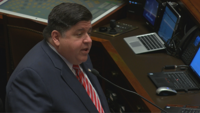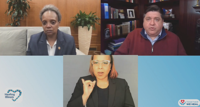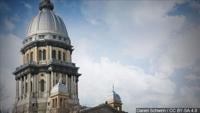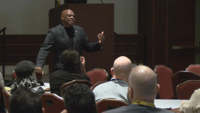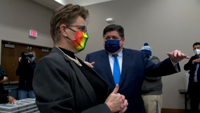SPRINGFIELD (ILLINOIS CAPITOL BUREAU) -- Governor JB Pritzker is proposing a budget of roughly $85 billion in spending and revenue for the next fiscal year with major investments in education, pensions and healthcare. Some are concerned the governor is depending on voters to pass his graduated income tax proposal in order to balance his budget. Pritzker says his "Fair Tax" could be a bridge to fairness.
"These rates would go into effect only if Illinois removes the constitutional prohibition on a graduated tax, a decision that will be made by voters in November," Pritzker said Wednesday afternoon. "If the constitutional amendment is passed, those rates will go into effect January 1, 2021 - midway through our budget year."
$1.4 billion in reserves
Senior administration officials say Pritzker is prepared to have a balanced budget with or without the graduated income tax. For example, the governor says he wants to increase evidence-based funding for schools by $350 million. In reality, his plan would only distribute $200 million to schools and hold onto the leftover $150 million in case the graduated income tax isn't passed. Other funds left in the $307.8 million reserve bank for education include a $55.6 million increase for university operations, $14.9 million boost for community college operating grants and a $40.3 million proposed increase in funding for school district mandated categorical lines.
Healthcare and human services could see $482 million left in the reserves with the majority ($400 million) coming from the planned contribution to state employee group insurance costs. A $42 million increase for Medicaid providers and a $40 million boost for the Department of Aging Community Care Program would also be put on hold. The largest chunk of funding in the reserve ($602 million) would come from state and local governments, including a $300 million payment of corporate income tax refunds and a $100 million road fund to cover additional amounts for transit costs. The administration's budget document shows a hold on $75 million ready for implementing a hiring freeze targeted at state agencies this December. Officials also noted that $100 million of new funds for pension obligations and $50 million for the budget stabilization fund would also sit in the reserve bank.
"Because the reserve is so large, it inevitably cuts into some of the things we all hold most dear: increased funding for K-12 education, universities and community colleges, public safety and other key investments - but as important as these investments are, we cannot reasonably spend for these priorities until we know with certainty what the state's revenue picture will be," Pritzker stated. However, Republicans don't share the governor's optimism.
"It's not reasonable"
"Revenue sources that are part of current law - things like cannabis sales and other programs - that's reasonable to include that in a budget plan," said Rep. Tom Demmer (R-Dixon). "It's not reasonable to include in a budget plan revenue that comes from a hypothetical tax increase that has not yet passed voters."
Senator Dave Koehler disagrees with the Deputy House Republican Leader.
"It could have been very easy and kind of a political stunt to present a Doomsday budget and say here's the only thing we can do. He didn't do that," Koehler (D-Peoria) explained. "He said here's responsibly how we move forward, but here's responsibly how we even better our future if we're able to pass the constitutional amendment giving us the progressive tax."
Saving money for a rainy day
The governor says he expects recreational marijuana sales to bring in at least $46 million in revenue for the state's general fund for the next fiscal year and $10 million that can go directly towards paying down the large backlog of bills. Pritzker also mentioned money coming from sports betting, as he says the gambling should be ready to go for March Madness. Several lawmakers were glad to hear about Pritzker's proposal to put $100 million into the state's rainy day fund over the next 16 months. Administration officials said this would be the first contribution to the fund in over a decade.
"There's some concern what may happen a year or two down the road and if the economy does take a downturn, that would really put a crimp on state finances," remarked Sen. Steve Stadelman (D-Rockford). "Whatever we can we do - no matter what the amount may be - to save for a rainy day fund down the road I think makes good financial sense."
The base general funds estimate $40.7 billion in revenues or a 1.6% increase from the FY2020 revised based estimates, according to documents from administration budget staff. Pritzker's proposal inks $42 billion for spending to reflect the governor's commitment to pay the FY2021 pension contribution in full. The general funds also indicate a budgetary surplus of $108 million. Lawmakers on both sides of the aisle said they are happy to hear about the proposed investments in pension obligations, healthcare and the Department of Children & Family Services, but Republicans feel Pritzker is only focused on spending.
Taxing and spending
"It's also important to be realistic about the problems we're facing and not try to just gloss over the fact that we have major fiscal problems in the state that will not be addressed by more taxing and more spending," Rep. Patrick Windhorst (R-Metropolis) explained. Senator Jil Tracy (R-Quincy) added, "the spending ideas he came up with sound wonderful, but I don't really know where the money would come from."
Senate President Don Harmon (D-Oak Park) says Pritzker's proposal can start an important conversation about where the state is headed and what it could be. "I applaud his emphasis on the need to tackle college affordability and his recognition that early childhood education is the best investment we can make in our future," Harmon said.
Pritzker's proposal would give the Child Care Assistance Program a $100 million increase to provide care to nearly 140,000 children monthly. An additional $13.5 million in federal funding would help improve quality of the state's preschool programs. The governor is proposing a $50 million increase of funding for MAP grants with a new priority to dedicate 15% of the awards to community college students.
House Minority Leader Jim Durkin (R-Western Springs) says he is willing to negotiate with Pritzker and other Democratic leaders to pass a bipartisan balanced budget. But Durkin adds he won't agree on any plan incorporating new tax increases.
LOCAL LAWMAKERS CHIME IN ON BUDGET ADDRESS
State Representative Dave Severin (R-Benton): “Today, the Governor offered a pretty rosy picture of Illinois�� finances," said Severin. Optimism is great, but realistic planning is better, especially when it comes to budgeting. If you examine what he said, instead of how he said it, I heard more of the same tax and spend policies that have inflated our state’s budget and blown a hole in the pockets of hard working families. As of today, the State of Illinois still owes more than $7 billion in unpaid back bills. We can barely afford the budget that we passed last year and now we’re being asked to implement further increases.��
State Senator Paul Schimpf (R-Waterloo): “After listening to Governor Pritzker's budget address today, nobody can credibly argue that last year's budget, with its across-the-board spending increases, was not a disaster for Illinois' long term financial outlook," said Schimpf. "During this period of unprecedented economic expansion, we must seize the opportunity to get control of our spending and get our fiscal house in order. Sadly, Governor Pritzker is instead advocating an unbalanced budget with $1.6 Billion in new spending that will only make our situation worse. This is not the way forward.��
State Representative Patrick Windhorst (R-Metropolis): “The Governor takes a lot of pride in being an optimist,�� Windhorst said. “But, I think the time has come for Illinois to move forward using a more realistic, pragmatic approach as we work on passing a new budget for next fiscal year. What we heard today was a long wish list of new spending proposals that maybe, possibly could be paid for by more tax increases. Illinois is still broke, financially. The Governor’s proposal to spend another $2 billion next year does not match up with the financial realities that we face. We have a bill backlog of more than $7 billion, unfunded pension liabilities that are estimated higher than $130 billion, and Illinoisans already pay the highest taxes in the nation. More government spending paid for by higher taxes on families and employers will only drive more people out of the state.��
State Representative Terri Bryant (R-Murphysboro): “The Governor gave a polished, upbeat speech, like he always does,�� Bryant said. “I don’t have a problem with optimism, but I believe you have to be realistic. The reality is that Illinois is still in a tough fiscal spot, despite the progress that has been made to pass balanced budgets. The Governor proposed $2 billion in new spending that mainly relies on the passage of the income tax increase proposal that will be on the ballot in November 2020,�� Bryant said. “That issue is ultimately for the voters to decide. What is not up for debate is the fact that Illinoisans are already the highest taxed citizens in the country and families and businesses are packing up and moving to other places in record numbers.��
Senator Dale Fowler (R-Harrisburg): "While I recognize today was a starting point with this budget address, I have real concerns about the $1.6 billion in proposed new spending. I feel like we need to be focusing on more job creation and more retaining of the businesses we currently have and the job creators that we have. I really feel like, that's our focus."


